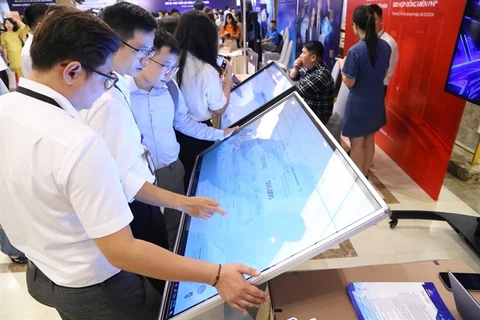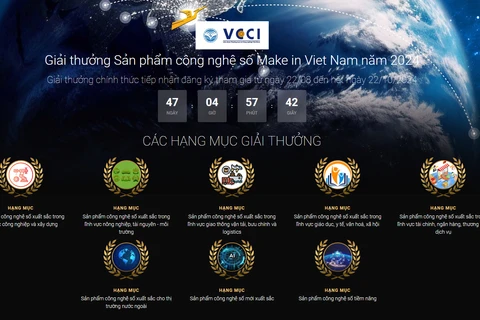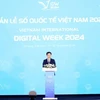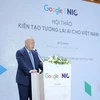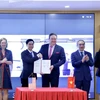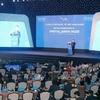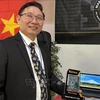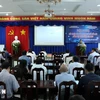
Hanoi (VNA) – Vietnam has a lot of potential to participate in the digital technology supply chain, especially in the fields of design, human resources training, and chip manufacturing, Nguyen Thanh Tuyen, Deputy Director of the Department of Information Technology and Communication Industry at the Ministry of Information and Communications (MIC) has said.
He made the remarks at a conference organised by MIC on October 17 which aims to help Vietnamese digital technology enterprises increase investment, expand markets, and exploit business opportunities in countries around the world.
The event served as a key forum for analysing potential, challenges, and strategic solutions to help Vietnamese businesses to go global, focusing on ASEAN markets.
Vietnam is an attractive destination for foreign direct investment (FDI), especially in the fields of manufacturing and technology. But the proportion of investment in information technology is still small, indicating significant growth potential. Domestic markets remain modest but are growing well, supported by a young and competitive workforce.
To date, the quality of human resources has been improving through partnerships with major tech companies, high-quality training programmes, and an increasing number of IT students. However, he noted that it is necessary to continue enhancing the technical skills and vocational training in the future. "Collaborating with leading global tech firms such as Bosch, Qualcomm, and Samsung is a sound approach to improving training quality," he said.

Regarding the development environment, Tuyen mentioned that government support policies are in place. Specifically, the draft Law on Digital Technology Industry will create a more favourable legal framework for digital technology enterprises.
He pointed out that businesses from developed countries like the US, Japan, the Republic of Korea, Singapore, and Australia and the EU are actively seeking investment and collaboration opportunities with Vietnamese IT enterprises. This presents a significant opportunity for Vietnamese companies to access international markets, technology, and experience.
However, domestic enterprises still face various limitations in competitiveness. They still largely focus on software outsourcing, so Tuyen suggested that greater investment in research and development and innovation is a must to enhance competitiveness.
Echoing Tuyen’s view, Vu Van Chung, Deputy Director of the Foreign Investment Agency under the Ministry of Planning and Investment, said Vietnamese companies remain primarily focused on software outsourcing, lacking international experience, with limited breakthrough products and an unclear brand identity. Meanwhile, competition from global technology giants poses a significant challenge.
A promising "playing field"
Nguyen Thanh Huy, Head of the Asia-Africa Market Department under the MPI, pointed to opportunities in the ASEAN region for Vietnamese digital technology businesses. With a population exceeding 650 million, ASEAN is a dynamic economy in the midst of a robust digital transformation, representing a highly promising “playing field”, he said.

Last year, Vietnam's trade value with ASEAN attained 73.4 billion USD. Additionally, countries in the region are gradually shifting towards services, with this sector gaining a prominent share of the economic structure in the last decade - 71% in the Philippines, nearly 61% in Singapore, and 56% in Thailand. This shift creates substantial demand for digital solutions and services. Moreover, e-commerce in the region is booming, projected to reach 1 trillion USD by 2030, with a surge in internet users, opening a golden opportunity for Vietnamese enterprises.
Huy emphasised that the ASEAN Digital Economy Framework Agreement (DEFA) will serve as a significant boost, promoting cooperation and digital integration across the region. This first-of-its-kind regional digital economy agreement is expected to accelerate online trade among Southeast Asian countries, unlocking a multi-trillion-dollar potential for the digital economy by 2030.
Ha The Duong, Deputy General Director of Viettel Global Investment JSC, suggested that Vietnamese digital technology enterprises need a comprehensive strategy to thrive internationally. Innovation is essential, along with robust investment in R&D to develop innovative products and establish competitive advantages, he said, adding that building a strong brand is crucial for attracting customers and partners.
Duong also highlighted the importance of leveraging government support policies, viewing these as key resources, especially by connecting with the MoIC and Vietnam’s trade offices abroad.
Additionally, he stressed that adhering to international law is a vital principle for international business. Finally, fostering a corporate culture of flexibility, adaptability, and respect for cultural diversity will help enterprises integrate and succeed in the global market./.
